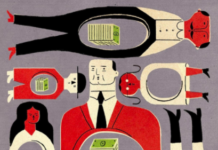Targeting Hypocrisy Reduces Islamophobia and Collective Blame of Muslims
Interventions calling attention to participants’ hypocrisy proved effective in reducing Islamophobia and collective blame of Muslims for individual acts of violence.
5 Ways to Address a Mental Health Crisis Without Calling 911
From The Body Is Not An Apology: For many people, calling the police during a mental health emergency can result in brutality. Here are five...
Nature Still Battles Nurture in the World of Social Genomics
From Nature: In her new book, Social by Nature: The Promise and Peril of Sociogenomics, Catherine Bliss discusses the social context and potentially biodeterministic implications of the...
Few Counselors Are Trained to Treat Racial Trauma
From ThinkProgress: A new study found that the majority of counselors in the United States are not prepared to identify or treat race-based trauma, which...
Why I See a Black Queer Therapist
In this essay for them, Steven W. Thrasher describes how seeking treatment from a black queer therapist has helped him heal from the emotional distress and trauma...
How Medical Professionals Have Enabled Torture
From Boston University School of Public Health: A new journal article in the American Journal of Public Health evaluates the similarities between the use of medical...
Connections Between Climate Change Concerns, Mental Health, and Pro-Environmental Actions
Concerns about the impact of climate change on animals and nature results in more effective coping to reduce hopelessness about climate change and promotes pro-environmental behaviors.
Underestimating Social Determinants of Health Linked to Right-Wing Authoritarianism
Social determinants have been seen to have an equal, if not greater, influence on health as individual behaviors, yet this evidence is largely ignored. Researchers investigate why this is the case.
Is Everything Johann Hari Knows About Depression Wrong?
In this piece for The Guardian, Dean Burnett critiques Johann Hari's new book challenging what we know about depression. According to Burnett, many of the points...
The Psychology of Inequality
From The New Yorker: A number of studies show that much of the damage done by being poor comes not from the conditions of poverty itself,...
The Autism Paradox
In this piece for Aeon, Bonnie Evans chronicles the history of the diagnosis of autism, from its establishment as a marker of dysfunction and impairment to the...
Histories of Violence: Neurodiversity and the Policing of the Norm
In this interview for the Los Angeles Review of Books, cultural theorist and philosopher Erin Manning discusses neurodiversity, a movement that seeks to depathologize traits, experiences, and...
Why It’s Time to Let Psychoanalysis Into Politics
In this piece for Prospect, Susie Orbach explains how insights from psychoanalysis can help us understand our current political, social, and economic climate.
"Politically, socially, ecologically and economically,...
Mental Health Seclusion to be Scrapped After UN Condemnation
From Stuff: In 2015, the United Nations Committee Against Torture expressed concern at New Zealand's use of seclusion against mental health patients. According to a...
Study Investigates Factors that Foster Posttraumatic Growth in Prison
Emotional support, religion, and searching for meaning are positively correlated with posttraumatic growth among prisoners.
Writing Women Into Psychology
From Psychology Today: A recent study examining a sample of widely used social psychology textbooks found that the contributions of women and people of color...
The Non-Binary Brain
From Aeon: Although many misogynists justify their prejudice by arguing that men and women are biologically different, the evidence shows that our brains are neither...
Introducing the Power Threat Meaning Framework
From The British Psychological Society: A group of senior psychologists and prominent service user campaigners has published a report offering an alternative framework to understand emotional distress.
"The Framework...
Study Examines US Mortality Rates for First-Episode Psychosis
At 12 months, rates of mortality for those diagnosed with first-episode psychosis are 24 times higher than the general population.
When Your Antidepressant Isn’t as Safe as You Think
In this piece for Psych Central, Dr. Viatcheslav Wlassoff discusses some of the safety issues and adverse effects of antidepressants.
"When it comes to side effects, anticholinergic...
Word Salad is Not “Disorganized Thought and Speech”
This piece for Holistic Elephants discusses the role of social context and environment in our perception and construction of "word salad," a common symptom of psychosis and...
How Pharma Uses the Charge of “Stigma” to Sell Drugs
From The Epoch Times: Many advocacy groups claiming to combat the stigma of mental illness are actually front groups that represent the interests of pharmaceutical...
Antipsychotics, Restraints, and Seclusion Raising Concerns
From ABC Australia: Australia's high rate of antipsychotic prescriptions, as well as the frequent usage of restraints and seclusion, has raised concerns among Australian mental health advocates, researchers,...
Neoliberalism Drives Increase in Perfectionism Among College Students
Meta-analytic study detects upsurge in patterns of perfectionism in young adults and explores how neoliberalism contributes to this trend.
When the Cure is the Cause
From Undark Magazine: In late 1970, a pharmacologist discovered that an antibiotic drug designed to cure a disease called SMON (subacute myelo-optic neuropathy) was actually causing...

































